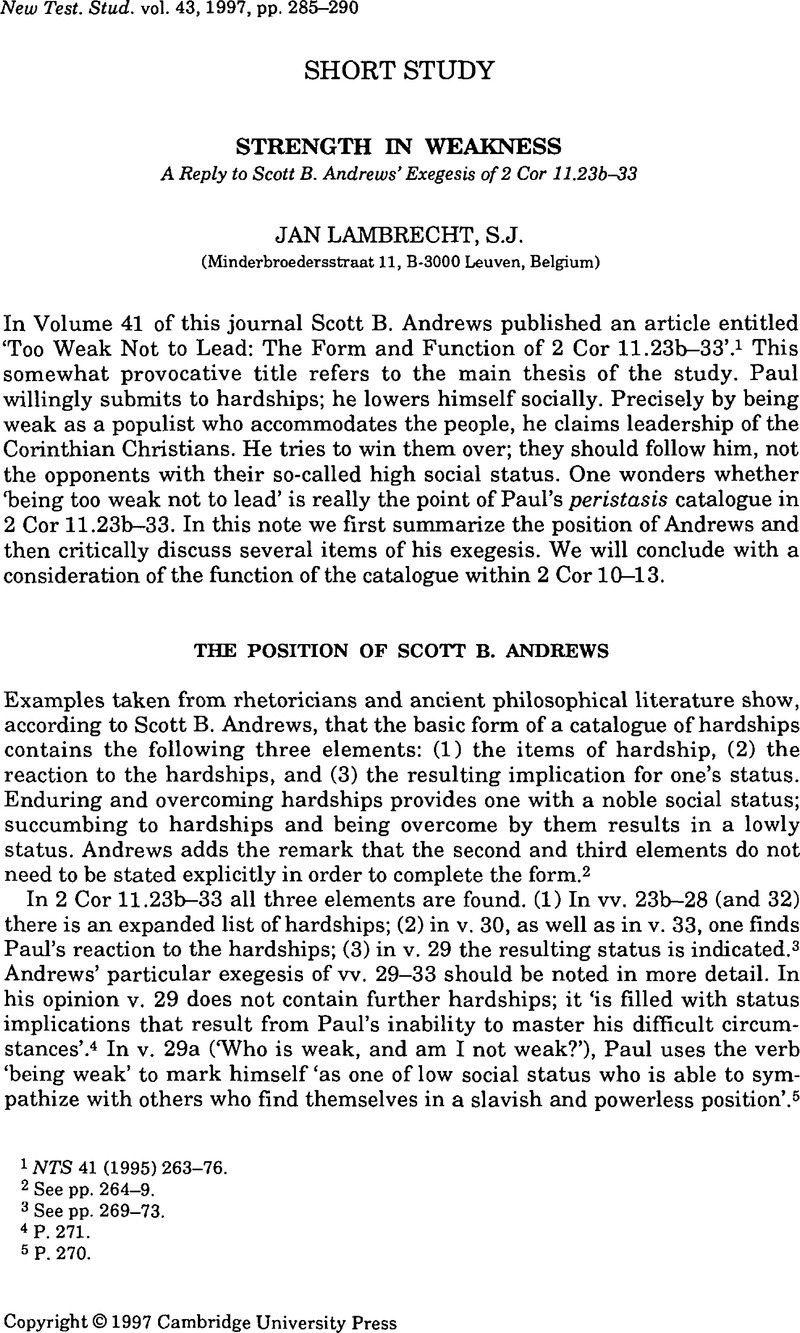Published online by Cambridge University Press: 05 February 2009

1 NTS 41 (1995) 263–76.
2 See pp. 264–9.
3 See pp. 269–73.
4 P. 271.
5 P. 270.
6 P. 271.
7 Ibid.
8 P. 272.
9 See pp. 273–6.
10 P. 274.
11 Ibid.
12 Cf. p. 275.
13 P. 275. Andrews refers to ‘the positive descriptions of the populist or demagogic model’ in Nicolaus of Damascus' account of Cyrus and also in Antisthenes’report of the discussion before the army between Ajax and Odysseus: who of them ‘is more worthy of receiving the weapons of the deceased Achilles?’ He admits, however, that the form of populist leadership ‘is viewed unfavourably in the majority of ancient Greco-Roman sources’ (ibid.).
14 P. 276.
15 Ibid.
16 Ibid.
17 In this note we refrain from using references to commentaries and other publications.
18 See the second time in 12.5. In both verses we have the same future tense. Compare ta ττζ σθευιαζ μου καυχσομαι (11.30) with οὺ καυχσομαι εἰ μ υ ταîζ σθευεíαιζ (12.5).
19 On p. 271 Andrew uses a perfect tense: ‘Who has been entrapped?’, but also a present:‘Who is entrapped?’ On p. 270 equally he writes a perfect: Paul ‘has been burnt up’, but elsewhere a present: ‘I am burnt up.’
20 P. 271.
21 Ibid.
22 On p. 271, Andrews speaks of ‘the same word in 1 Cor 3.15’, but the verb is κατακασεται (‘will be burned up’) and only the noun πρ is present in v. 15 (as in v. 13). The verb is used in 7.9 in the sense of ‘to burn with desire, to be inflamed’.
23 Cf. pp. 272–.
24 P. 272.
25 P. 272.
26 Ibid.
27 Within 12.1–10, one can compare vv. 2–4; with (2), the second type of boasting, and vv. 5b and 7–9ab with (4), the fourth type.
In chapters 10–13 the verb σθευω occurs 7x, the noun σθυεια 6x, and the adjective σθευζ 1x (10.10: Paul's bodily presence). There are several nuances in the use of this terminology in chs. 10–13. Paul speaks of the weaknesses of his Christians (11.29a), the weakness of Christ (13.3b and 4a) and, above all, of his own weakness. In 11.21 and 29 the verb indicates his positive apostolic attitude. Elsewhere, i.e., from 11.30 onward, Paul wants to underline the absence of personal human strength (in 11.30 and 12.5 he refers to events which illustrate his utmost powerlessness; they are respectively narrated in 11.32–3 and 12.–7–9). I do not think that in this context Paul points to his ‘moral’ weakness. It would seem that the use of the verb in 11.29 suggested to him the noun (with a different nuance) in 11.30.
28 See note 43 on p. 273.
29 Ibid. It is, however, doubtful that the second members of the antithetical sentences in 2 Cor 4.8–9 indicate Paul's reactions: ‘afflicted, but not crushed; perplexed, but not driven to despair; persecuted, but not forsaken; struck down, but not destroyed’. Rather it is God's assistance and intervention which are emphasized in them.
30 Ibid.
31 Cf. Lambrecht, J., ‘Philological and Exegetical Notes on 2 Corinthians 13,4’, in Bieringer, R.–Lambrecht, J., Studies on 2 Corinthians (BETL 112; Leuven: Peeters, 1994) 589–98.Google Scholar
32 See Lambrecht, J., ‘Dangerous Boasting: Paul' Self-Commendation in 2 Corinthians 10–13’, in: Bieringer, R., ed., The Corinthian Correspondence (BETL 125; Leuven: Peeters, 1996) 325–6.Google Scholar